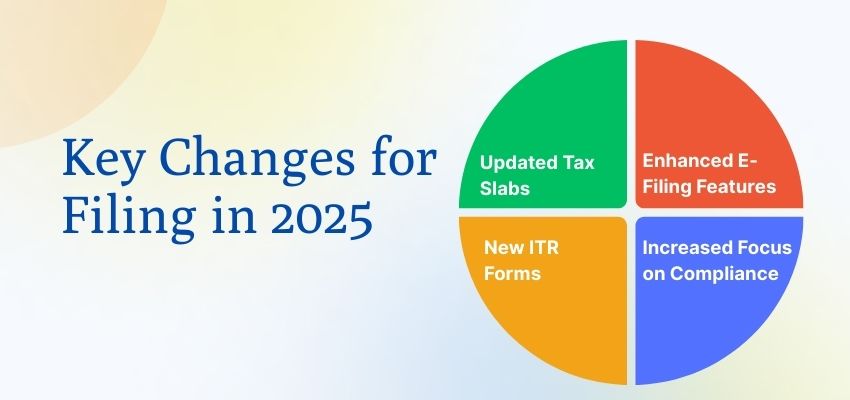Understanding Income Tax in India
The Importance of Filing Income Tax Returns
- Legal Obligation: Filing tax returns is a statutory requirement for individuals and entities earning taxable income.
- Financial Planning: Filing returns provides insights into your financial standing, enabling better budgeting and planning.
- Loan Applications: Lenders often require proof of income through filed tax returns when assessing loan applications.
- Claiming Refunds: If excess tax has been paid during the financial year, filing a return is essential to claim a refund.
- Carrying Forward Losses: Filing returns allows taxpayers to carry forward losses from previous years, which can be set off against future income.
Key Changes for Filing in 2025

1. Updated Tax Slabs
For the assessment year 2025-26, the tax slabs may see adjustments. It is crucial to stay updated with the official announcements regarding changes in tax rates to understand your tax liability.
The Income Tax Department may introduce revised Income Tax Return (ITR) forms, reflecting changes in the tax laws and compliance requirements. Ensure you are using the correct form based on your income sources.
3. Enhanced E-Filing Features
The e-filing portal is expected to have enhanced features for a smoother filing experience, including user-friendly interfaces, better error detection, and real-time updates.
4. Increased Focus on Compliance
The government is likely to intensify its focus on tax compliance, including stricter scrutiny of returns and enhanced data analytics to identify discrepancies.
Recommended: 15 Key Points for Foreigners Filing Indian Tax Returns
Steps to File Income Tax Returns in 2025

Step 1: Determine Your Tax Residency Status
Tax residency is crucial in determining your tax liability. An individual is considered a resident if they meet any of the following criteria:
- Stayed in India for 182 days or more in the current financial year.
- Stayed in India for 60 days or more in the current financial year and 365 days or more in the preceding four years.
Step 2: Gather Required Documents
Before initiating the filing process, ensure you have the following documents ready:
- PAN Card: A Permanent Account Number is mandatory for filing.
- Form 16: Issued by your employer detailing salary income and tax deductions.
- Form 26AS: Tax credit statement showing TDS deducted against your PAN.
- Bank Statements: For interest income and other transactions.
- Investment Proofs: Documents for claiming deductions under sections like 80C, 80D, etc.
Step 3: Register on the E-Filing Portal
- Visit the Official E-Filing Website: Access the Income Tax Department's e-filing portal.
- Register: If you are a new user, click on ‘Register’ and fill in the required details.
- Verify Your Account: A verification link will be sent to your registered email or phone.
Select the correct ITR form based on your income sources:
- ITR-1 (Sahaj): For residents with income up to ₹50 lakh.
- ITR-2: For individuals not having income from business or profession.
- ITR-3: For individuals with business income.
- ITR-4 (Sugam): For individuals opting for the presumptive taxation scheme.
- Log In: Use your credentials to access the e-filing portal.
- Select ‘File Income Tax Return’: Choose the relevant assessment year.
- Fill in the Details: Enter personal information, income details, deductions, and tax computation.
Step 6: Review and Validate
Carefully review the entered information for accuracy. Use the validation feature to check for errors or missing fields.
Step 7: Submit the ITR
Once you are satisfied with the information, submit your return electronically. An acknowledgment (ITR-V) will be sent to your registered email.
Step 8: Verify Your ITR
Verification is essential. You can verify your ITR through:
- E-verification: Use Aadhaar OTP, net banking, or other electronic methods.
- Send ITR-V: If not e-verified, print the ITR-V, sign it, and send it to the CPC Bangalore address within 120 days.
Step 9: Track Your Refund Status
If applicable, track the status of your tax refund through the e-filing portal. Refunds are processed based on ITR verification status.
Read Also: Comprehensive Guide to Accounting and Taxation Services
Common Challenges in Filing Income Tax Returns
1. Technical Glitches
Users may encounter technical issues during the e-filing process. Ensure you have a reliable internet connection and check system requirements.
Selecting the incorrect ITR form can complicate the filing process. Familiarize yourself with the eligibility criteria for each form before proceeding.
3. Missing Documentation
Incomplete documentation can hinder the filing process. Ensure all necessary documents are ready before starting.
4. Compliance with Deadlines
Missing the filing deadline can lead to penalties. Keep track of important dates and set reminders to avoid late submissions.
in 2025 requires awareness of the latest updates and adherence to the prescribed processes. By following the steps outlined in this guide, taxpayers can ensure compliance and avoid penalties.
For personalized assistance in filing your income tax return, consider reaching out to Tripathi & Arora Associates.




